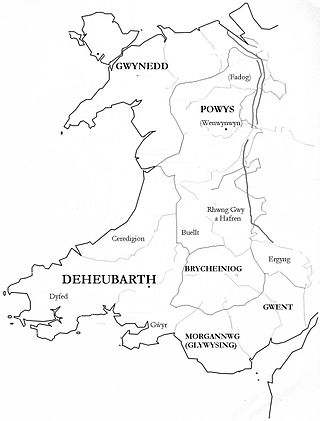Related Research Articles

Deheubarth was a regional name for the realms of south Wales, particularly as opposed to Gwynedd. It is now used as a shorthand for the various realms united under the House of Dinefwr, but that Deheubarth itself was not considered a proper kingdom on the model of Gwynedd, Powys, or Dyfed is shown by its rendering in Latin as dextralis pars or as Britonnes dexterales and not as a named land. In the oldest British writers, Deheubarth was used for all of modern Wales to distinguish it from Hen Ogledd, the northern lands whence Cunedda originated.

The Kingdom of Powys was a Welsh successor state, petty kingdom and principality that emerged during the Middle Ages following the end of Roman rule in Britain. It very roughly covered the northern two-thirds of the modern county of Powys and part of today's English West Midlands. More precisely, and based on the Romano-British tribal lands of the Ordovices in the west and the Cornovii in the east, its boundaries originally extended from the Cambrian Mountains in the west to include the modern West Midlands region of England in the east. The fertile river valleys of the Severn and Tern are found there, and this region is referred to in later Welsh literature as "the Paradise of Powys".

Nest ferch Rhys was the daughter of Rhys ap Tewdwr, last King of Deheubarth in Wales, by his wife, Gwladys ferch Rhiwallon ap Cynfyn of Powys. Her family is of the House of Dinefwr. Nest was the wife of Gerald de Windsor, Constable of Pembroke Castle and son of the Constable of Windsor Castle in Berkshire, by whom she was the ancestress of the FitzGerald dynasty.

Rhys ap Tewdwr was a king of Deheubarth in Wales and member of the Dinefwr dynasty, a branch descended from Rhodri the Great. Following the Norman Conquest, he had to pay William the Conqueror to keep his kingdom, which lasted until the end of William's reign.

Bleddyn ap Cynfyn, sometimes spelled Blethyn, was an 11th century Welsh king. King Harold Godwinson and Tostig Godwinson installed Bleddyn and his brother, Rhiwallon, as the co-rulers of kingdom of Gwynedd on his father's death in 1063, during their destruction of the kingdom of their half-brother, king Gruffydd ap Llywelyn. Bleddyn became king of Powys and co-ruler of the Kingdom of Gwynedd with his brother Rhiwallon from 1063 to 1075. His descendants continued to rule Powys as the House of Mathrafal.
Caradog ap Gruffydd was a Prince of Gwent in south-east Wales in the time of Gruffydd ap Llywelyn and the Norman conquest, who reunified his family's inheritance of Morgannwg and made repeated attempts to reunite southern Wales by claiming the inheritance of the Kingdom of Deheubarth.

Cadwgan ap Bleddyn (1051–1111) was a prince of the Kingdom of Powys in north eastern Wales. He was the second son of Bleddyn ap Cynfyn who was king of both Kingdom of Powys and Gwynedd.

Gwent was a medieval Welsh kingdom, lying between the Rivers Wye and Usk. It existed from the end of Roman rule in Britain in about the 5th century until the Norman invasion of Wales in the 11th century. Along with its neighbour Glywyssing, it seems to have had a great deal of cultural continuity with the earlier Silures, keeping their own courts and diocese separate from the rest of Wales until their conquest by Gruffydd ap Llywelyn. Although it recovered its independence after his death in 1063, Gwent was the first of the Welsh kingdoms to be overrun following the Norman conquest.

Glywysing was, from the sub-Roman period to the Early Middle Ages, a petty kingdom in south-east Wales. Its people were descended from the Iron Age tribe of the Silures, and frequently in union with Gwent, merging to form Morgannwg.
This article is about the particular significance of the century 1101–1200 to Wales and its people.
Owen is usually an anglicised variant of the Welsh personal name Owain. Originally a patronymic, Owen became a fixed surname in Wales beginning with the reign of Henry VIII. Etymologists consider it to originate from Eugene, meaning 'noble-born'. According to T. J. Morgan and Prys Morgan in Welsh Surnames: "the name is a derivation of the Latin Eugenis > OW Ou[u]ein, Eug[u]ein ... variously written in MW as Ewein, Owein, Ywein. LL gives the names Euguen, Iguein, Yuein, Ouein. The corresponding form in Irish is Eoghan." Morgan and Morgan note that there are less likely alternative explanations, and agree with Rachel Bromwich that Welsh Owein "is normally latinised as Eugenius", and that both the Welsh and Irish forms are Latin derivatives.
Gruffudd or Gruffydd is a Welsh name, originating in Old Welsh as a given name and today used as both a given and a surname. It is the origin of the Anglicised name Griffith[s], and was historically sometimes treated as interchangeable with the etymologically unrelated Germanic name Galfrid. The Welsh form evolved from the Common Brittonic Grippiud or Gripuid. The meaning of the name is “strong lord.”
Owain is a name of Welsh origin, variously written in Old Welsh as Ougein, Eugein, Euguen, Iguein, Ou(u)ein, Eug(u)ein, Yuein, and in Middle Welsh as Ewein, Owein, and Ywein. Other variants of the name Owain include Ewein, Iguein, Owein, Ouein, Ywen, Ywein, Ywain, Yuein, and Yvain. Owain has also been Latinized as Oenus.
Fychan is a surname. Notable people with the surname include:
Owain ap Hywel was a king of Glywysing and Gwent in southeastern Wales.
Cadwgan ab Owain was a joint king of Glywysing in Wales of the High Middle Ages along with his brother Gruffydd. His other brother Morgan ruled in Gwent.
Gruffydd ab Owain was a joint king of Glywysing in Wales along with his brother Cadwgan. His other brother Morgan ruled in Gwent.
Bowens is a surname of Welsh origin, it is a alteration of Bowen with English patronymic-s. Modified spelling of Dutch Bouwens, an alteration of Bauwens.
Ab Owen may refer to: